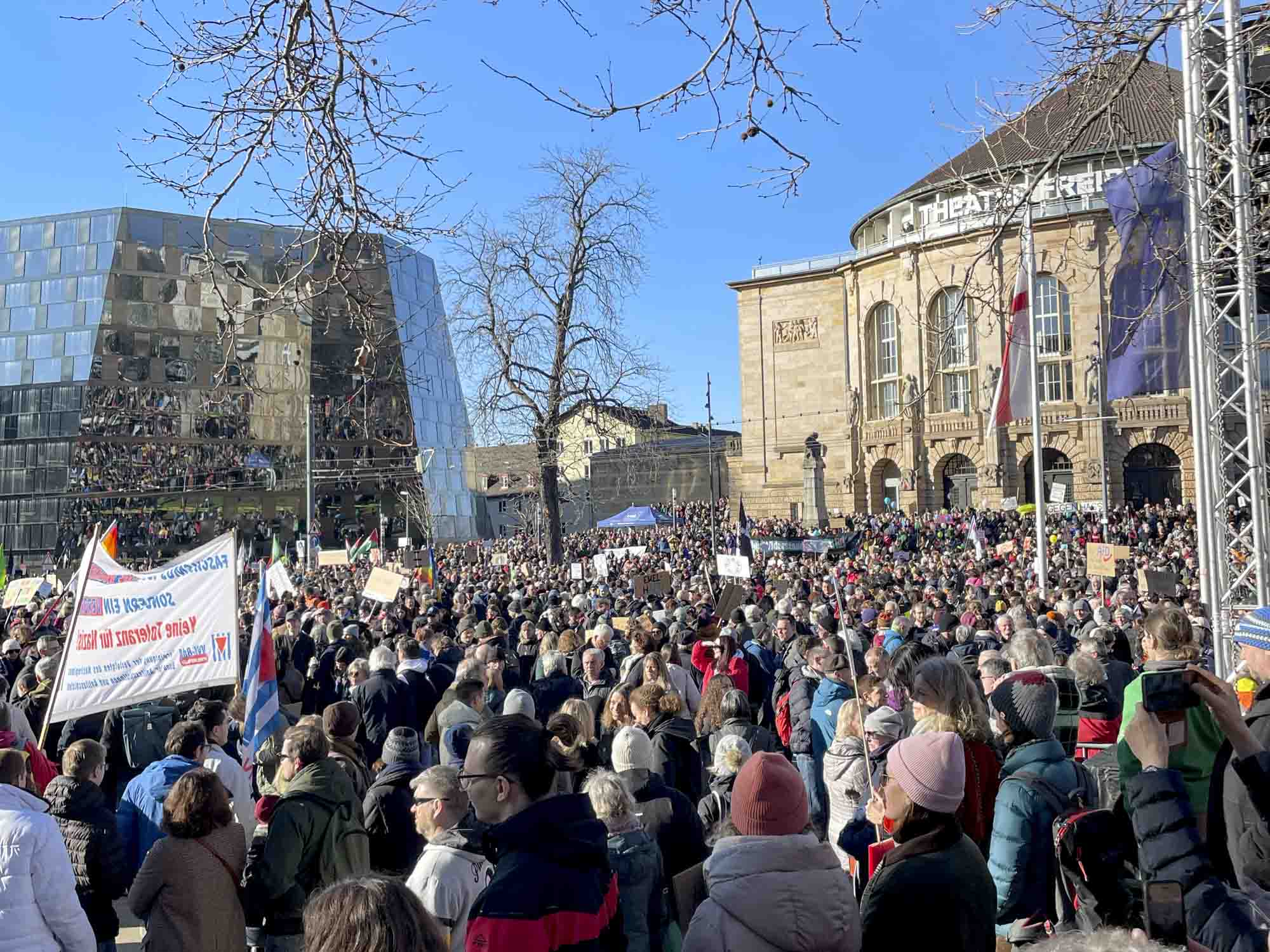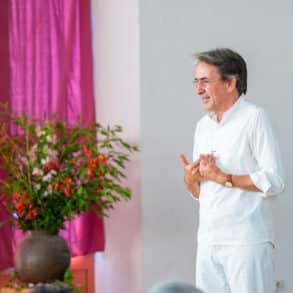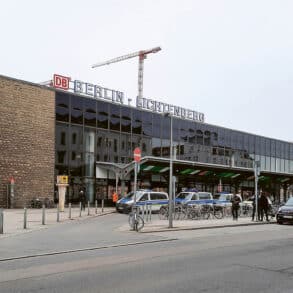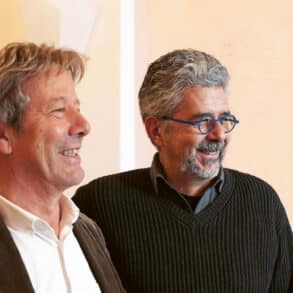According to historian Andreas Wirsching, Germany is now more challenged to protect democracy than at any time since 1945.1 Christina Morina, a historian with a focus on contemporary history, says that public debate and contempt for politics are reaching a level of intensity that threatens to undermine the democratic order from within. In this context, what can we learn from the pro-democracy demonstrations being held across Germany?
According to the official count, 30,000 people gathered for a demonstration a few Saturday’s ago on the Platz der Alten Synagoge [Old Synagogue Square] in Freiburg. I stood on a step to one side and watched as the square filled up in the morning. Individuals, families, and couples strolled into the sunny space from the side streets.
Architectural Imagination
What eloquent architecture surrounds the assembly gathering in the square here! The venerable theater of Freiburg stands here, in classical style, with its sweeping semicircle of half-arches. Yes, art is often like this: beautiful, sublime, and, at the same time, transported out of time, searching for its power. A glass palace rises up next to it. As I gaze upon it, a man next to me comments, “That’s the university library.” A very different picture: the flat façade reflects the sunlight, it seems powerful and self-contained, and, yet, no less forbidding than the graceful theater. My gaze continues and comes to the place where the synagogue once stood. I hear: “There used to be a fountain here, where water collected and children splashed around. The town council then discussed ‘whether children playing was the right thing in such a holy place.’” I strain my imagination and ask, “What holiness will reach the next generation?” And continuing around, there is a block of the University of Freiburg, sheathed in scaffolding. Yes, I think our education is a grand construction site. Thus, the square of the old synagogue appears as an architectural imagination of our time, as a threefold construction site: an art that does not easily fulfill its service of allowing us to imagine a future out of past beauty, a knowledge that might turn more towards life than merely reflecting it, and an educational world that could transform from one powerful block into many open pavilions.
Existence is Duty
At 11 a.m., the square is full, and the sun makes it over the pediments and pours golden light onto the colorful sea of people. Helpers in fluorescent yellow vests walk through the rows, holding a bamboo pole in front of their noses. They collect donations to cover the expenses of setting up the stage. Then, a rapper on the stage begins his angry chant about sexual liberation and discrimination. It is a strange contrast to the exuberant mood of all the people, young and old—“the middle of society” we read in many accounts. Some hold their cell phones in the air to capture the diversity of the gathering, others squint into the sun, waiting. “How we treat others shows who we are” is written on a piece of cardboard that a woman holds in front of her chest on a broomstick. I ask her why she chose this particular phrase. Her answer: “I read it, and I liked it.” So again, unlike the rallying cries from the stage, there is no agitation, no desire, rather just an existence for the sake of existence. Many say that they are participating in a gathering for the first time or for the first time in a long time. And why? “Because it’s necessary”; “I’m worried about what’s happening on the right”; “I paid attention in school.” These are the answers I get. The atmosphere reminds me of a youth conference at the Waldorf School in Mainz around 25 years ago. After a passionate talk by Henning Köhler, there was no applause from the students, just silence. A pupil called out to him to please continue speaking. When Waldorf teacher Werner Rauer saw that I was confused, he leaned towards me, smiled, and said: “There, you see: they don’t respond from the astral body with enthusiasm or indignation; they respond from the ‘I.’ That’s quieter and far more powerful.” A few years later, the magazine Der Spiegel [The Mirror] ran the following headline: “The mild-mannered youth.”2
The Dream of Togetherness

The slogan of the Germany-wide demonstrations on the first weekend of February, “We are the firewall,” does not fit with the silent rising up of one’s own personality. A wall is solid because of the bonding between the stones. My experience here is different. Speeches reminiscent of earlier protests come from the stage, the “Internationale” is chanted, and slogans are intoned to shout along with. This is hardly able to generate enthusiasm and idealism, warmth and light. And this is clearly seen on the individual faces. As one would expect for a university city, a city with ecological responsibility, there are clever, educated pairs of eyes squinting at the stage. A wall divides—it is stable and immovable because of its bonding. But, here—this is about dialog, about respect and recognition. Here, it is individual human beings who live out the dream of togetherness in diversity and tolerance. These ideals radiate when they also pertain to those whose dreams of nationalism and stability are now endangering democratic culture.
How nice it would be if the microphone was handed down from the stage and passed through the 30,000 people in the square. Then, I would be able to hear the 80-year-old man to my right, tapping the pavement stones with his walking stick during the rapping, share why he is here. The group of students further ahead could tell me what’s on their minds. A new community, a community that is able to protect the endangered democracy, as I can experience here, is formed from the strength, warmth, and insight of individuals. This cannot be “against” something, as is sometimes shouted from the stage in a friendly, or unfriendly, or even frightening manner. It should be a “for” something. That is probably the longing that is articulated at a deeper level here. Will the demonstrations achieve anything? I think they are already showing that the populist slogan of being the people’s advocate is losing weight when so many are now taking to the square and streets. The demonstrators are saying that they are here out of responsibility—responsibility for something bigger. I believe the demonstrations will make a difference when this motive replaces party thinking in the government corridors.
Translation Joshua Kelberman
Footnotes
- Susanne Beyer and Eva-Maria Schnurr, “Historikergespräch über den Schutz der Demokratie: ‘Wir sind zum Kampf herausgefordert‘—‘Man sollte nicht auf die Rhetorik der Rechten einsteigen’” [Historians discuss the Protection of Democracy: “We are challenged to fight . . . . One should not fall for the Rhetoric of the Right”], Spiegel Online (Feb. 4, 2024).
- Susanne Beyer, Nikolaus von Festenberg, and Reinhard Mohr, “Die jungen Milden” [The mild-mannered youth], Spiegel Online (July 11, 1999).









